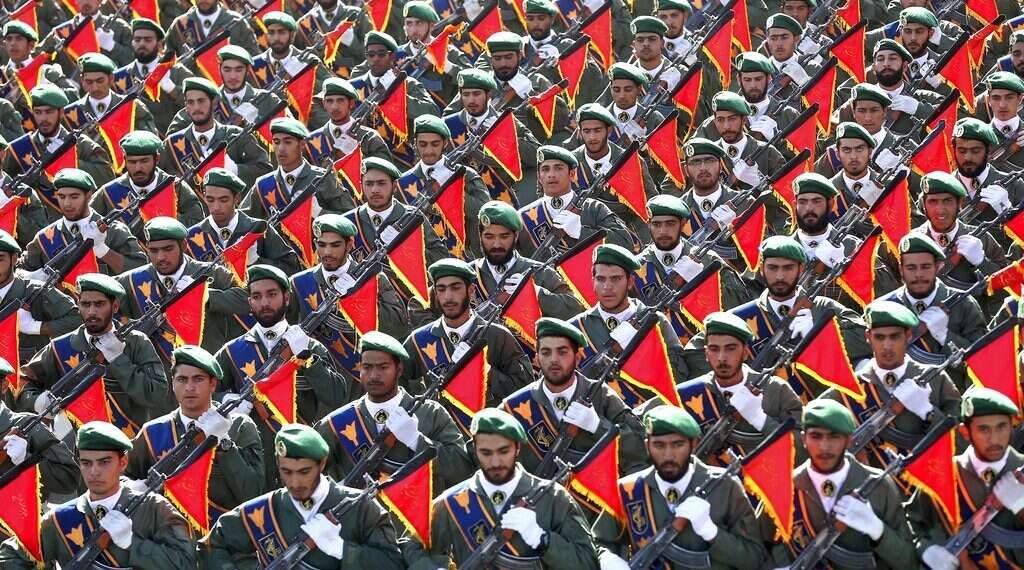With IAEA set to issue critical report on Iran, diplomatic officials say Vienna talks may not go ahead as planned. In historic first, Israel takes part in joint Red Sea naval drill with the US, the UAE, and Bahrain.

Iranian Revolutionary Guard troops march in a military parade in Tehran, Sept. 21, 2016 | File photo: AP
Two weeks before talks on Iran’s nuclear program are set to restart in Vienna, Israel is making clear it plans to kick its independent efforts to stop Iran up a notch.
A senior diplomatic official said Israel’s goal was to ensure Iran was prevented from ever becoming a nuclear state.
He said Israel would act independently as necessary. As part of this effort, Jerusalem has begun to build up its military so as to have the ability to contend with the challenge posed by Iran in both the nuclear arena but also its efforts to undermine regional stability.
He said Israel would contend with the challenge in a multidimensional manner to instill a sense of desperation among officials in Tehran.
Diplomatic officials, however, are of the mindset the talks may not be held at all.
With Iran is now in violation of the 2015 nuclear accord and the Nuclear Nonproliferation Treaty, International Atomic Energy Agency head Rafael Grossi is expected to issue a critical report of Tehran’s policies during his visit to the Islamic Republic next week. Israeli officials believe such a report could provide Iran with an excuse to call off the talks at the last minute.
Iranian entrenchment activities in the Middle East are occurring at sea as well as on land, an Israeli Navy official said, as Israel for took part in a joint Red Sea naval drill with the United States, the United Arab Emirates, and Bahrain for the first time.
The historic joint exercise, held last week under the auspices of the US Fifth Fleet, occurred as Iran held a major war exercise near the Strait of Hormuz, a naval chokepoint where some 20% of the world’s oil passes through.
That exercise included Iranian military drills in the Arab Gulf and the Arabian Sea.
The Red Sea exercise, meanwhile, simulated “basic” scenarios and boosted maritime security, said the Israeli naval official. “We exchanged information together. There will be more advanced exercises.”
While Iran is trying to deter and project power, Israel was working on cooperation, the official said.
Israel faces an ongoing terror threat at sea, he said, that included Iran’s efforts toward entrenchment through its proxies.
“We have to deal with the safety of the sea and keep it a safe dimension. Not just for Israel, which we are concerned with, but for all the countries around us,” he stated.
In describing Iranian threats, the officer drew attention to the July 30 drone attack on the Mercer Street oil tanker off the Oman coast that killed a British security guard and the ship’s Romanian captain.
“We are dealing with Iranian terror in many dimensions. The Mercer Street [attack] was a brutal terror act on an innocent vessel, and at the end of the day, two people were killed,” said the official.
That attack made clear the fact that Iran’s conduct “can also be a problem for other countries on land and at sea,” he said. “We’re not the only ones feeling this threat. We see other places where those [Iranian] UAVs [unmanned aerial vehicles] are being fired in this arena in many countries. This is not just a threat to Israel. It’s a challenge for the area.”
The drill was made possible thanks to the US putting Israel under the responsibility of its Central Command, which covers the Middle East, and away from EUCOM, in September.
Senior US and Israeli defense officials, including Gen. Mark Milley, chairman of the Joint Chiefs of Staff; Gen. Kenneth McKenzie, commander of CENTCOM; Vice Adm. Brad Cooper, commander of the US Fifth Fleet, which is headquartered in Bahrain; Israel Defense Forces’ Chief of Staff Lt. Gen. Aviv Kochavi; and Israeli Navy Commander Vice Adm. David Sa’ar Salama formulated a program of joint naval training in recent months.
The Fifth Fleet’s umbrella coalition maritime forces are currently made up of 34 countries; Israel is set to become its 35th member.
Israeli and American naval vessels trained together in the Aqaba Gulf on Aug. 31 in an exercise involving the Fifth Fleet, but the Israeli naval official said this latest drill was the most important collaboration of its kind to date.
He described scenes of Israeli Navy officers and sailors meeting with Bahraini, Emirati, and American counterparts onboard the same ships. The US Navy’s USS Portland Landing Platform Dock took part in the drill.
“This will increase cooperation and the safety of the Red Sea—but not just the Red Sea,” said the official.
“This is the beginning of cooperation which will be conducted in stages under the planning that we did together. What is beautiful about the sea is that, for many years, it has been easier to create partnerships and cooperation there,” the source said. “The sea is further away from land, and sometimes it is not visible to the eye. It is a different dimension.”
JNS.org contributed to this report.



Leave a Reply
You must be logged in to post a comment.